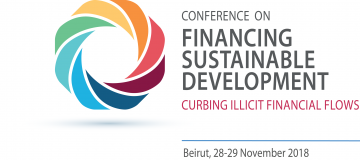
Beirut, 21 November 2018 (Communication and Information Unit)--Private capital constraints and increased exposures to illicit finance are among the key challenges facing development across the Arab region. A score of international experts and high-level officials are gathering at the United Nations Economic and Social Commission for Western Asia (ESCWA) next week to discuss solutions to better finance sustainable development in the region.
On 28 and 29 November, the “Conference on Financing Sustainable Development - Curbing Illicit Financial Flows” will be held at the United Nations House in Beirut with the key participation of ESCWA Acting Executive Secretary Mounir Tabet, World Bank Group Senior Vice President Mahmoud Mohieldin, and UN Conference on Trade and Development (UNCTAD) Secretary-General Mukhisa Kituyi.
Keynote speeches will also be delivered by the Egyptian Minister of Finance and Chairman of the G77 and China, Mr. Mohamed Maait, the Vice President of the Court of Cassation and representative of the Governor of the Central Bank of the Arab Republic of Egypt, Mr. Ahmed Said Khalil, and the Lebanese Minister of Finance, Mr. Ali Hassan Khalil. Senior experts from around the world will also share their insights and assessments at the conference, including the International Civil Society Group on Financing for Development, the Economist, the Brookings institute, Oxfam, Transparency International, alongside UN regional Commissions, funds and agencies.
According to ESCWA, if the current reversals in net cross-border financing for development flows are maintained, the Arab region would need US$2.3 trillion in development finance to achieve the Sustainable Development Goals (SDGs) by 2030 in addition to the cost of financing the SDGs themselves in gross capital formation previously estimated at US$3.6 trillion.
“The conference seeks to trigger affirmative financing action by interrogating the conditions and conduits to conjure domestic, international, public, private, traditional and innovative financing solutions to finance the 2030 Agenda,” said Hisham Taha, Economic Advisor and Head of the Financing for Development Office at ESCWA.
“It also aims to map the landscape of measures to be deployed to combat illicit financial flows, especially at a time when these flows are evolving, both in scale and sophistication. If financial outflows are reversed, the Arab region could well be placed on a trajectory to meet part of the bill of the SDGs in our region,” he added.
This endeavour is set to further support the efforts of the Group 77 and China in leading the path toward transitioning from funding to actually financing transformative change and deploying the needed measures to further combat IFFs at a time when ongoing financing leakages outpace detection and continue to evolve both in scale and sophistication to the detriment of developing the states’ domestic resources mobilization capacities.
The Civil Society FfD Group dubbed the conference as a “timely and important initiative” and stressed: “We are firmly convinced that the FfD process can and must play a pivotal role in removing many of the structural barriers to the socio-economic transformation and advancing systemic reforms of global economic frameworks to realign them with the imperatives of human rights, gender justice, people-centeredness and sustainable development.”
The conference is set to assess the state of Financing for Development (FfD) leading to the implementation of both the 2030 and Addis Ababa Action Agendas and to re-assert inter-regional action to combat illicit financial flows (IFFs). Taking cue from the recently launched United Nations Secretary-General Strategy on ‘Financing the 2030 Agenda for Sustainable Development (2018-2021), the Conference serves as an important milestone ahead of the 2019 High-Level Dialogue on FfD and the High-Level Political Forum on Sustainable Development (HLPF).
The findings of next week’s conference will be used as a guide for future work on FfD and IFFs in order to maintain action to eliminate them by 2030.
For more information:
Nabil Abu-Dargham, Head, ESCWA Communication and Information Unit
+961-70-993-144; email: dargham@un.org
Ms Rania Harb +961-70-008-879; email: harb1@un.org
Ms Mirna Mahfouz: +961-70-872-372; email: mahfouz@un.org





